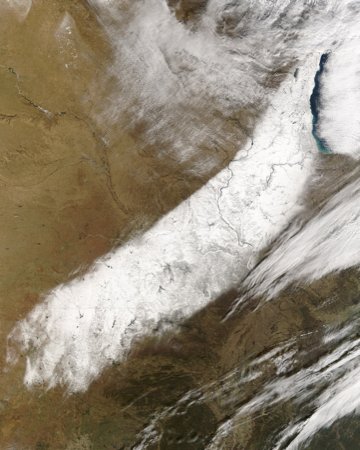Sunday afternoon activity: Sitting here wondering if it will really rain over the next couple of days, as the forecasts have suggested for a few days, or not. So far, we’ve had clouds and some drizzle. While I ponder the relatively unusual prospect of a late June rainfall in the Bay Area, I was looking at weather satellite pictures, and then at loops of satellite pictures made over the last few hours. I started to wonder whether I could find a full day’s worth of those looped images, or maybe a week’s or a month’s. I still haven’t found anything like that. But I did find plenty of versions of the the stock views from NOAA’s GOES West (GOES stands for Geostationary Operational Environmental Satellite). No matter how many times I see it, the view of the full disk of the Earth (above, taken this morning; click for a larger image) evokes wonder. Below (click for much larger image) is the West Coast in beautiful enhanced infrared color, complete with the weather systems that could bring us rain.
Sandy at Night
I was just visiting one of my favorite news picture sites, The Atlantic’s In Focus blog, and came across this storm image. The caption reads: “This nighttime satellite image of Hurricane Sandy was acquired by the Visible Infrared Imaging Radiometer Suite (VIIRS) on the Suomi NPP satellite around 2:42 a.m. Eastern Daylight Time, on October 28, 2012. (Suomi NPP, NASA, NOAA).”
I never cease to wonder at the beauty of these images captured from space, even when they’re images of a phenomenon that we experience as unimaginable power and violence when it comes ashore.
In Focus: Hurricane Sandy in Photos
In Focus: Hurricane Sandy After Landfall
In Other Tourism-Related News

That's the external fuel tank from a 1989 space shuttle mission, a picture my brother-in-law Dan happened across while we were discussing shuttle history (and he was correcting my memory on a couple of fine points, such as the fact the first during the first four missions, the shuttle was equipped with ejection seats). The subject came up while we were remembering the Challenger disaster in 1986 (a subject another friend brought up on Facebook).
Anyway, I'm always a sucker for a good space program picture, and this is one. Not to over-romanticize, you could look at this and say it's simply part of a wasteful industrial process (the external tank is jettisoned and partially disintegrates as it falls through the atmosphere into the Atlantic). There's more to it, for me: a picture from an untamed place that holds unlimited promise, a picture of our civilization reaching to extend its understanding and its capabilities.
Sure, we have lots of problems here at home (that blue background–what a beautiful place). It's always seemed to me we ought to be able to extend our reach out there and do the work we need to do down here, too.
(End of the foregoing.)
At Night
By way of an Open Salon blog: a recent composite view of the Earth at night, courtesy of NASA (click for bigger images). There’s lots to reflect on here. For example: Look at the Korean peninsula, and check out the difference between South and North (for more on night-time lighting in North Korea, see this).
Technorati Tags: photography
Midwest: Flocked
A beautiful NASA satellite shot of the Midwest after the snow- and icestorm that blew through a couple weeks ago. Worth taking a look at the larger image (just click the one below).
(By way of exit 670)

